Travis Green was introduced as the new coach for Ottawa on Wednesday. I wrote about his time in Vancouver and why he could be good for the top Senators skaters in the fantasy game. It is a very interesting offseason ahead in Ottawa and, by happenstance, I wrote about their 2023-24 season and their future later in these Ramblings.
*
Sam Bennett did not play on Wednesday night but coach Paul Maurice said that he expects Bennett to be on the road trip with the team after Game 2. That would indicate he's not far off from returning, but as with all injury concerns in the playoffs, nothing is certain until we see the player on the ice for warmups.
*
Jonathan Drouin was back on the ice as he works his way back from injury:
Drouin is a big part of the team in that he can play on the top line with Nathan MacKinnon, leaving two of Mikko Rantanen, Artturi Lehkonen, and Valeri Nichushkin on the second line. It just helps put everyone in their proper roles, but he still seems a way off.
*
Florida rebounded nicely from their Game 1 loss against Boston with a 6-1 win in Game 2. The Bruins got out to an early lead thanks to Charlie Coyle's first goal of the 2024 postseason halfway through the first period. The Panthers roared back in the second period with goals from Steven Lorentz, Aleksander Barkov, and Gustav Forsling. The latter tally registered with fewer than two seconds left on the clock, and it appeared to be the type of back-breaking goal that effectively ends a game. That is exactly what happened, and now the series it tied 1-1 heading back to Boston on Friday night.
Barkov got Sam Reinhart and Vladimir Tarasenko back for wingers partway through the game. It is fair to say that the change paid off. He also scored again in the third period, finishing the game with two goals, two assists, four shots, and a whopping nine hits.
Eetu Luostarainen and Brandon Montour scored the others.
Jeremy Swayman was pulled after the fourth goal but this game was not on him in any manner.
Game 2 had it all: Brad Marchand laying out Matthew Tkachuk, Tkachuk fighting David Pastrnak, several 10-minute misconducts, Barkov going nuclear offensively, and Sam Reinhart posting a four-assist game with one of those 10-minute misconducts. Cannot wait for Game 3.
*
My offseason reviews of each of the 16 non-playoff teams continues today. We have already combed through the seasons of the San Jose Sharks, the Chicago Blackhawks, the Anaheim Ducks, the Columbus Blue Jackets, the Montreal Canadiens, and the Arizona Coyotes (now in Utah). Today, we move up another standings placement and get to the Ottawa Senators. Let's look at what went wrong, what went right, and where they go from here. This is all through a fantasy lens, of course.
Data from Natural Stat Trick, Evolving Hockey, HockeyViz, and Frozen Tools with salary cap data from Cap Friendly. Any tracking data is from AllThreeZones unless otherwise noted.
What Went Wrong
The first mention here has to be Ottawa's goaltending. At 5-on-5, the team finished 30th by save percentage and were 1 of 3 teams with a save percentage under .900. Overall, Ottawa's netminders were 31st by save percentage with a combined mark of .885, and only the Philadelphia Flyers finished worse.
A lot of the issues are laid at Joonas Korpisalo's feet and the starting goalie does need to be better; he finished dead last by Goals Saved Above Expected (via Evolving Hockey). In fairness to him, that is a cumulative stat so more games played can drive that number down; on a 60-minute basis, he goes from dead last to fourth-to-last:

It is still not good by any means, but I do think it's important to delineate "worst in the league" from "bad, but not quite abysmal".
This is where the team and the goaltender meet, and the play of one skater can turn the fortunes of an entire team.
Defenceman Travis Hamonic skated 707:18 at all strengths for Ottawa. His on-ice expected goals against rate was 3.63, which was by far the worst on the team (no one else was below 3.2). Relative to his team, Hamonic's expected goals against numbers were roughly the same as Erik Gudbranson from Columbus, while the actual goals against numbers were similar to that of Josh Brown in Arizona.
Korpisalo had Hamonic on the ice in front of him for 431:43 in total ice time and the team allowed 30 goals in that time, or a goals against rate of 4.17 per 60 minutes. This is what the opposition's 5-on-5 shot chart looked like when Korpisalo had Hamonic on the ice (red is bad, and the darker the red, the worse it is):
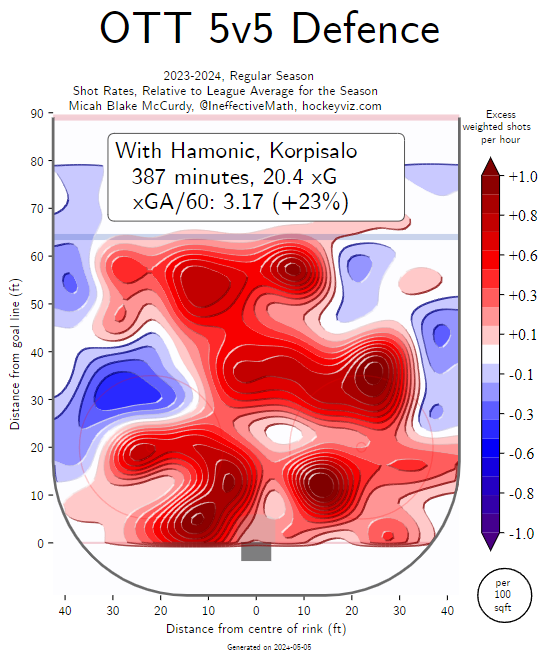
When Korpisalo did not have Hamonic on the ice – or the goaltender's other 2649 minutes – the goals against rate was cut to 3.13 per 60 minutes, or a 25% drop. At 5-on-5, this is what the opposition's shot chart looked like when Korpisalo was in net without Hamonic on the ice:
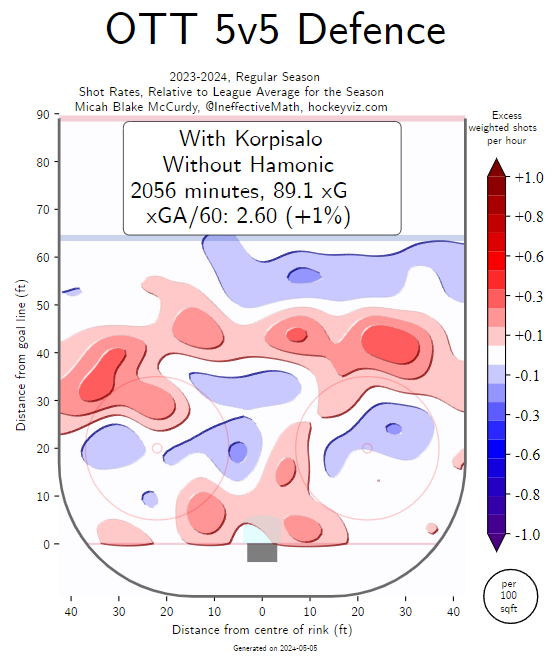
This is now two years in a row of Hamonic having both the worst expected goals against rate and actual goals against rate among all Senators defencemen. Over the last two seasons at 5-on-5, there are five regular defencemen across the league to be in the 10th percentile of relative expected goals against and relative actual goals against while also being below average by shot attempt share. These are the five names:

To be clear, this isn't to lay it all at the feet of Hamonic. Again, Korpisalo needs to be better in the non-Hamonic minutes just to have fantasy relevance because it's not as if he had great numbers when the defender was on the bench or just not in the lineup. All this is to say that even just average defensive numbers from Hamonic's role in 2024-25 would be a massive uptick for Korpisalo and have knock-on effects like fewer defensive zone faceoffs all around.
That brings us to special team play in general. Ottawa did take fewer penalties and dropped from the second-most penalized team in 2022-23 to the middle of the league in 2023-24 (about 17% fewer power play opportunities given). Despite the more disciplined play, they actually allowed more PP goals against per game because they had the third-worst rate of goals against per 60 minutes when short-handed.
This is another area where Hamonic was at the bottom of the team with the highest goals against rate, but no one looked good; Artem Zub had the lowest goals against rate of 8.9 per 60 minutes, or roughly the 25th percentile of the league. When 75% of regular penalty-killing defencemen in the league have a lower goals against rate than the best Ottawa defender, it should tell us there are a lot of problems here.
What is curious is that Ottawa's 30th-ranked goals against rate was not backed up by the shots against as they ranked 15th by that measure. By shots allowed on the PK, they finished between Vancouver and Seattle, two teams who allowed about two fewer goals against per 60 minutes. This is an area where some of the blame has to go to the goalies, and both Korpisalo and Anton Forsberg were equally bad with PK save percentages of .820 and .824, respectively.
The power play also a big problem for the team. In 2022-23, they drew the most power play opportunities per game, finished second in the league in power play goals per game, and were 8th by goals scored per 60 minutes. In 2023-24, they again led in power play opportunities per game but fell all the way to 18th in PP goals scored per game, landing 25th by goals scored per 60 minutes. What happened?
It seems pretty straightforward: they abandoned what made them successful. In 2022-23, the Senators created a lot of shots around the net on the power play (dark brown areas are where they shot much higher rates than the league average):
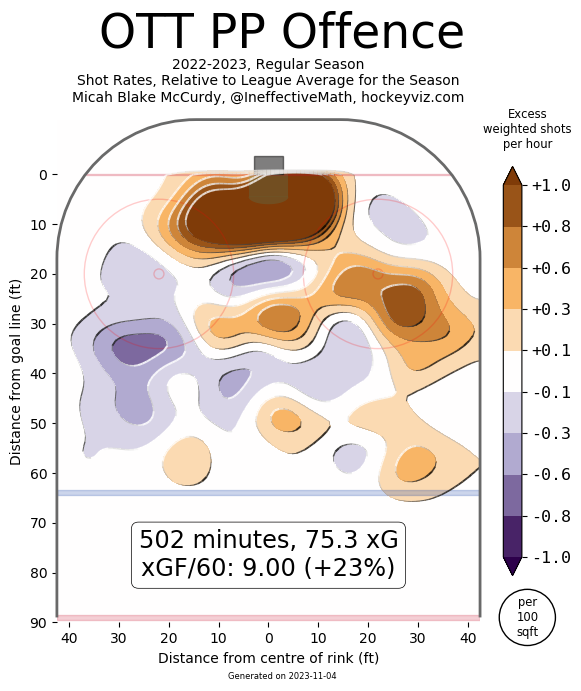
This season, they focused more on shots from the right circle and blue line while neglecting the front of the net:

The curious part is the team scored most on the power play with Jakob Chychrun on the ice, and he scored nearly 26% of the team's PP goals when he was on the power play. He scored seven PP goals overall, which is highest mark of his career. What is problematic is that he led the league by share of his team's PP goals scored by a wide margin, and when looking at any regular top PP defenceman in his range by team goal share, none were top power play teams (Los Angeles was closest at 10th by goals-for rate):

It is great for Chychrun and his fantasy managers that he scored so much with the power play. It is probably not great for everyone else, and that'll be something to monitor early next season with Travis Green behind the bench.
Ottawa being much worse on the power play with Thomas Chabot is the curious part. The team had a three-year low goal rate with him on the ice and the goals-for rate of 6.24 per 60 minutes was a 22% drop from his three-year average from 2020-2023. Here is the crux of all this, aside from Chychrun: Ottawa scored 4.89 goals/60 on the power play with Chabot and Tim Stutzle on the ice, and 7.86 goals/60 when Chabot was on the ice without Stützle.
It was a bad season for Stützle when considering the expectations. Across his first three seasons, the center scored 1.75 goals per 60 minutes with the man advantage, shooting 14.8%. He had just one PP goal the entire 2023-24 season and shot 2.9%. He mentioned he had a shoulder injury late in the season but he had zero power play goals across his first 60 games of the season. That hurt his fantasy value, but so did the fact he fell from an average of 0.81 goals/60 minutes at 5-on-5 across his first three seasons to 0.61 in 2023-24. Overall, his shooting percentage was 9.4%, a big decline from the three-year average of 14.2%.
As to why he saw a point production decline, the simple answer is not many minutes with Brady Tkachuk. Stützle spent about 24% of his 5-on-5 time with the star winger in 2023-24, compared to over 80% in 2022-23. This season, Stützle produced 2.5 points per 60 minutes at 5-on-5 in his minutes with Tkachuk, and about 2.08 points/60 without him. Add that to a power play that declined hard, and we get his 70-point season.
For a bit of a deeper answer, the tracking data offers some insight. Here is how Stützle fared at 5-on-5 by different tracked events in 2023-24 when compared to 2022-23:
| 2022-23 | 2023-24 | |
| Scoring Chance Assists/60 | 5.14 | 3.77 |
| Passes From Centre Lane/60 | 3.25 | 1.55 |
| Rush Shots+Assists/60 | 14.04 | 12.19 |
| Carry% On Zone Entries | 75.6% | 68.1% |
| Chance Rate on Carry Entries | 25.6% | 22.6% |
| Exits With Possession | 86% | 84.2% |
For Stützle are declines across the board in a lot of key areas from transition out of the zone, to transition into the zone, to assisting on scoring chances, to playing off the rush. Whether part of it is skating so few minutes with Tkachuk or not, for a player that should be a franchise cornerstone, it's just not good enough. There was a clear change in offensive approach by the coaching staff(s), and that matters, but we would like to see a rebound in some of these areas in 2024-25. Maybe the new, attack-oriented coach will help in this regard.
Josh Norris did not have a good season but it's a wonder if he was healthy all year. Claude Giroux started well but had 12 points over the final 27 games, or one-third of the season. Chabot had a three-year average of one PP point every 4.4 games, a number that ballooned to one PPP every 7.3 games in 2023-24 (a normal PP year and his per-game averages may have been career-highs). It was not a good year for a lot of key players and that must be better in 2024-25.
What Went Right
Despite drops for a lot of his teammates, Tkachuk's 37 goals, 357 shots, 134 penalty minutes, and 12 power play goals were all career-best marks. If 37 goals, 74 points, 22 power play points, 4.4 shots per game, and 3.6 hits per game are what he does when things go wrong for a lot of teammates, imagine what he does when things go right. He is truly a multi-category fantasy superstar and is a first-round pick in such formats. That he's missed four games in his last five seasons speaks to durability that should be coveted in fantasy leagues, too.
A drop in power play production hurt Drake Batherson a bit, but he still finished with career-high marks in goals (28), points (66), and penalty minutes (42). He fell just shy of 200 shots (196) and 100 hits (98) so there is multi-cat value here and it's clear the team thinks of him as their top right winger of the future. Importantly, the team had nearly an identical goal rate with Batherson on the ice alongside Tkachuk as without, so he wasn't reliant on the superstar for production. He was healthy and his shooting percentage rebounded to roughly the range it was in his first two full seasons after a sharp decline in 2022-23. He is a genuine 30-goal, 70-point, 200-shot, 100-hit threat now.
It wasn't a true breakout season for Ridly Greig with 13 goals and 13 assists in 72 games, but this is where we have to note his usage. Those 72 games saw him skate 881:22 at 5-on-5 and he did not skate one-third of that time with any single forward. The closest was Mathieu Joseph (32.9%) with Dominik Kubalik next (29.6%). He did not skate 25% of his 5-on-5 time with any of the team's top forwards (Tkachuk, Stützle, Giroux, or Batherson) and skated about 44% more often with Parker Kelly than Tkachuk. Despite that, Greig's goal rate at 5-on-5 was the same as Stützle's while his primary assist rate was tied with Batherson and Shane Pinto. With all their top-6 forwards returning, Greig seems to be on the outside looking in, but he was productive with bad line mates and that's a great sign for the rookie. He will have banger league value moving forward.
It was good-and-bad for Pinto. He missed half the year with his gambling suspension, but his carry-in percentage on zone entries was 60%, or much higher than the team average of 48.7%, while his assist rate on teammate scoring chances (3.45) was higher than the league average. The sample isn't big, but he played well with Tkachuk, and may have top-line billing next to him in 2024-25 because of it. That is good news for Pinto and bad news for Stützle.
Overall, it was a good fantasy season for Chychrun. His 14 goals were the second-highest total for a single season and his 41 points tied a career-high. He also set career-best marks with 154 blocks (had never reached 100), 204 shots (had never reached 180), and 60 penalty minutes (had never reached 50). The big reason is he played all 82 games, the first time in his career he played at least 70 games, let alone 80. It feels like he's been around forever, but he just turned 26 years old in March. Hopefully this is the start of a healthy trend because he can provide very good peripherals with double-digit goals and 40-50 points. That is a valuable multi-cat player, but he needs to play 75+ games, not 50-60.
While it wasn't a great fantasy season from Jake Sanderson, he did have 10 goals, 38 points, 14 PPPs, 139 blocks, and 2.0 shots per game. For a 21-year-old defenceman, those are good numbers, and he showed improvements in some tracking data like limiting turnovers in the defensive zone and assisting on teammate scoring chances in the offensive zone. All steps in the right direction and if his usage keeps rising, it may not be long until he's a 15-goal, 50-point, 200-shot rearguard.
Where They Go From Here
This is a crucial summer for Ottawa. After firing coach DJ Smith in December, they went with Jacques Martin in the interim. They brought in former Vancouver and New Jersey bench boss Travis Green, and the top priority has to be getting the special teams going. Even from a non-fantasy perspective, this is an era of the NHL where teams often need some success both on the PK and the PP. For clarification, there were 16 teams to finish even or worse by special team goal differential in the regular season. Of those 16 teams, only four made the playoffs, and none made it past the first round:
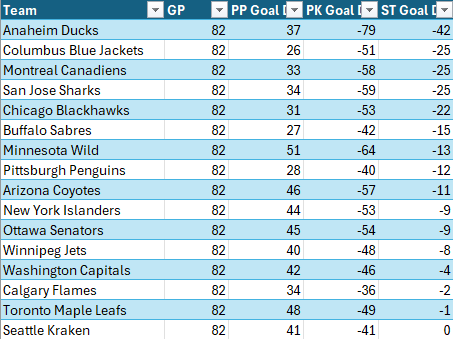
If they can get the power play back to what it was in 2022-23, and just get average results on the PK, it would go a long way to not only boosting the fantasy values of their top skaters and goaltenders, but just give them a much better chance at reaching the postseason.
The problem is there isn't much to be done with the roster. All of Stützle, Tkachuk, Batherson, Norris, Chabot, Sanderson, Artem Zub, and Korpisalo have at least three years left on their contracts. The good news is that the forwards don't have protection clauses on their contracts, but trading Tkachuk or Stützle is out of the question, Batherson's deal pays him under $5M a season so there's good value there, and Norris's value probably can't get lower than it is right now at nearly $8M a season. They can't really change much up front, and Chabot is the only blue liner without trade protections. Maybe they can trade Chabot but with four years left at $8M a season, but they may not want to do that, either.
In that sense, whatever happens to the roster, it'll be more about rebuilding the depth than it will be about making significant changes (outside of maybe shipping out one of Chabot or Chychrun). They have just $12M in cap space and both Pinto and Erik Brannstrom need new contracts. Even on bridge deals, that available cap space is probably cut in half, so making a splash in free agency is out of the question. Any real improvements will happen because of natural rebounds (like Stützle's shooting percentage) or the coaching change.
There is still a lot of goodness here for fantasy managers and a better power play would go a long, long way to rebuilding the values of players like Stützle, Norris, and Chabot. A better penalty kill will help Korpisalo but he also needs to be a lot better himself. It will be interesting to see ADPs of the non-Tkachuk skaters because players like Batherson, Stützle, Pinto, and Chabot may be good draft values come September. It could be tough sledding if that power play isn't back in the top-half of the league, and that remains the overarching concern in the fantasy game.
One Comment
Leave A Comment
You must be logged in to post a comment.

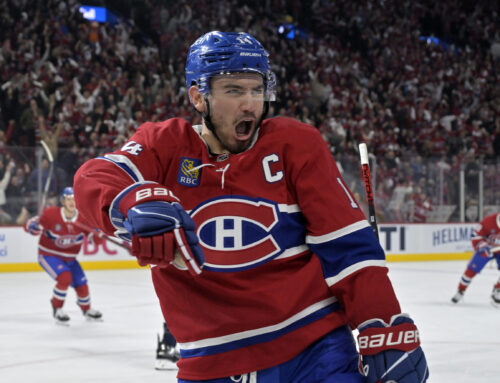
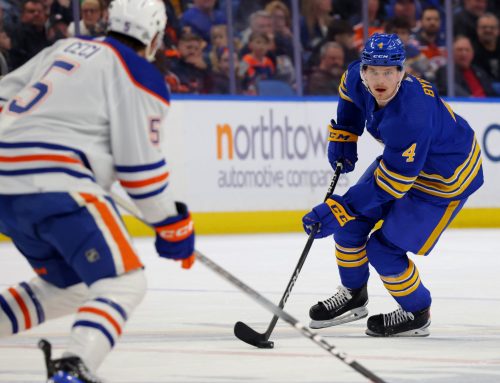
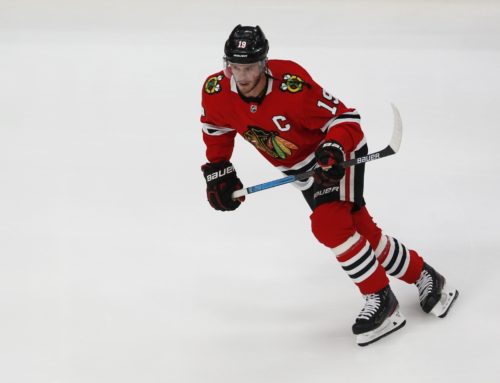
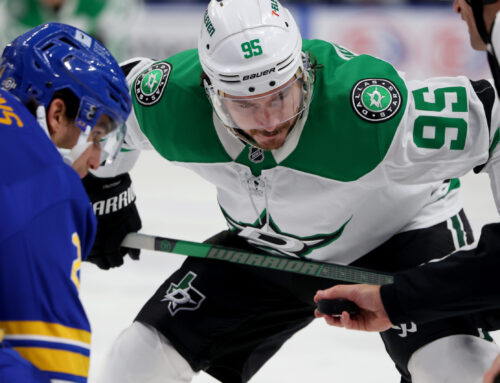
 BUF
BUF NYR
NYR CHI
CHI EDM
EDM CBJ
CBJ S.J
S.J VAN
VAN PIT
PIT ANA
ANA

No love/mention for the canucks-oilers game 1 at all?! juh-dang, yo. It was a thing.